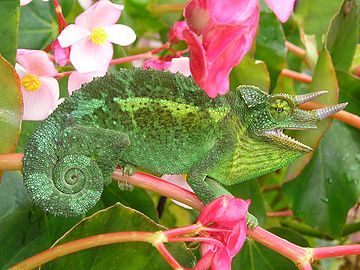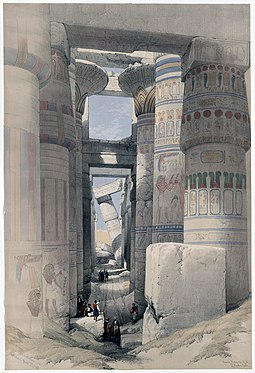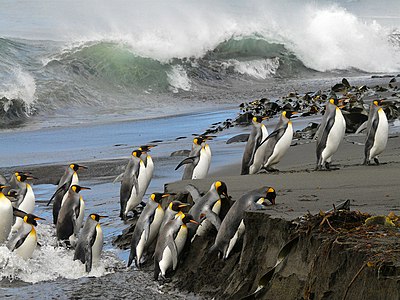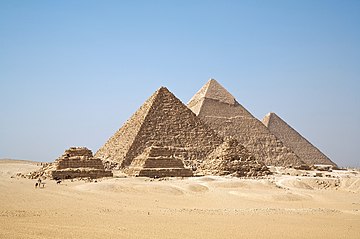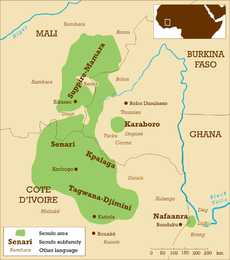Portal:Africa



Africa is the world's second-largest and second-most populous continent after Asia. At about 30.3 million km2 (11.7 million square miles) including adjacent islands, it covers 20% of Earth's land area and 6% of its total surface area. With nearly 1.4 billion people as of 2021, it accounts for about 18% of the world's human population. Africa's population is the youngest among all the continents; the median age in 2012 was 19.7, when the worldwide median age was 30.4. Based on 2024 projections, Africa's population will reach 3.8 billion people by 2099. Africa is the least wealthy inhabited continent per capita and second-least wealthy by total wealth, ahead of Oceania. Scholars have attributed this to different factors including geography, climate, corruption, colonialism, the Cold War, and neocolonialism. Despite this low concentration of wealth, recent economic expansion and a large and young population make Africa an important economic market in the broader global context. Africa has a large quantity of natural resources and food resources, including diamonds, sugar, salt, gold, iron, cobalt, uranium, copper, bauxite, silver, petroleum, natural gas, cocoa beans, and.
Africa straddles the equator and the prime meridian. It is the only continent to stretch from the northern temperate to the southern temperate zones. The majority of the continent and its countries are in the Northern Hemisphere, with a substantial portion and a number of countries in the Southern Hemisphere. Most of the continent lies in the tropics, except for a large part of Western Sahara, Algeria, Libya and Egypt, the northern tip of Mauritania, and the entire territories of Morocco, Ceuta, Melilla, and Tunisia, which in turn are located above the tropic of Cancer, in the northern temperate zone. In the other extreme of the continent, southern Namibia, southern Botswana, great parts of South Africa, the entire territories of Lesotho and Eswatini and the southern tips of Mozambique and Madagascar are located below the tropic of Capricorn, in the southern temperate zone.
Africa is highly biodiverse; it is the continent with the largest number of megafauna species, as it was least affected by the extinction of the Pleistocene megafauna. However, Africa also is heavily affected by a wide range of environmental issues, including desertification, deforestation, water scarcity, and pollution. These entrenched environmental concerns are expected to worsen as climate change impacts Africa. The UN Intergovernmental Panel on Climate Change has identified Africa as the continent most vulnerable to climate change.
The history of Africa is long, complex, and varied, and has often been under-appreciated by the global historical community. In African societies the oral word is revered, and they have generally recorded their history via oral tradition, which has led anthropologists to term them oral civilisations, contrasted with literate civilisations which pride the written word. During the colonial period, oral sources were deprecated by European historians, which gave them the impression Africa had no recorded history. African historiography became organized at the academic level in the mid-20th century, and saw a movement towards utilising oral sources in a multidisciplinary approach, culminating in the General History of Africa, edited by specialists from across the continent. (Full article...)
Selected article –
The Shangani Patrol (or Wilson's Patrol) was a 34-soldier unit of the British South Africa Company that in 1893 was ambushed and annihilated by more than 3,000 Matabele warriors in pre-Southern Rhodesia (now Zimbabwe), during the First Matabele War. Headed by Major Allan Wilson, the patrol was attacked just north of the Shangani River in Matabeleland, Rhodesia. Its dramatic last stand, sometimes called "Wilson's Last Stand", achieved a prominent place in the British public imagination and, subsequently, in Rhodesian history, similarly to events such as the Battle of the Little Bighorn and the Battle of the Alamo in the United States.
The patrol comprised elements of the Mashonaland Mounted Police and the Bechuanaland Border Police. Scouting ahead of Major Patrick Forbes's column attempting the capture of the Matabele King Lobengula (following his flight from his capital Bulawayo a month before), it crossed the Shangani late on 3 December 1893. It moved on Lobengula the next morning, but was ambushed by a host of Matabele riflemen and warriors near the king's wagon. Surrounded and outnumbered about a hundred-fold, the patrol made a last stand as three of its number broke out and rode back to the river to muster reinforcements from Forbes. However, the Shangani had risen significantly in flood, and Forbes was himself involved in a skirmish near the southern bank; Wilson and his men therefore remained isolated to the north. After fighting to the last cartridge, and killing over ten times their own number, they were annihilated. (Full article...)
Featured pictures –
Did you know (auto-generated) -

- ... that William H. Davis was the first teacher of Booker T. Washington and the first African American to be nominated as a candidate for West Virginia governor in 1888?
- ... that South African president Jacob Zuma requested a tour of a Sainsbury's supermarket during his state visit to the United Kingdom in 2010?
- ... that although it was only formed in late 1939, the French 87th African Infantry Division inflicted 6,600 casualties upon the German forces and fought until the very end of the Battle of France?
- ... that Mary Jane Patterson, whose mother was an African-American slave, gained a BA degree in 1862 having taken a "gentleman's course"?
- ... that prior to becoming West Virginia's first African-American judge, Leon P. Miller was McDowell County's assistant prosecuting attorney, a Welch city councilman, and U.S. Attorney for the Virgin Islands?
- ... that Freedom of Religion South Africa filed an unsuccessful lawsuit to keep child spanking legal?
Categories
Selected biography –
Nnamdi Benjamin Azikiwe (16 November 1904 – 11 May 1996), commonly referred to as Zik of Africa, was a Nigerian politician, statesman, and revolutionary leader who served as the 3rd and first black governor-general of Nigeria from 1960 to 1963 and the first president of Nigeria during the First Nigerian Republic (1963–1966). He is widely regarded as the father of Nigerian nationalism as well as one of the major driving forces behind the country's independence in 1960.
Born in Zungeru in present-day Niger State to Igbo parents from Onitsha, Anambra State, Azikiwe learned to speak Hausa which was the main indigenous language of the Northern Region. He was later sent to live with his aunt and grandmother in his hometown Onitsha, where he learnt Igbo language. Living in Lagos State exposed him to learning the Yoruba language, and by the time he was in college, he had been exposed to different Nigerian cultures and spoke three languages. (Full article...)
Selected country –
 |
 |
||

| |||
Ghana, officially the Republic of Ghana, is a country in West Africa. It borders Côte d'Ivoire to the west, Burkina Faso to the north, Togo to the east, and the Gulf of Guinea to the south. It was inhabited in pre-colonial times by a number of ancient kingdoms, including the Ga Adangbes on the eastern coast, the inland Empire of Ashanti and various Fante states. Trade with European states flourished after contact with the Portuguese in the 15th century, and the British established a crown colony, Gold Coast, in 1874. Upon achieving independence from the United Kingdom in 1957, the name Ghana was chosen for the new nation to reflect the ancient Empire of Ghana that once extended throughout much of west of Africa.
Ghana is a republic and member of the Commonwealth of Nations. Its head of state is President John Agyekum Kufuor, the ninth leader of the country since independence. The government sits at Osu Castle. The Parliament of Ghana is unicameral and dominated by two main parties, the New Patriotic Party and National Democratic Congress. (Read more...)
Selected city –

Lilongwe (UK: /lɪˈlɒŋweɪ/, US: /-wi, lɪˈlɔːŋweɪ/,) is the capital and largest city of Malawi. It has a population of 989,318 as of the 2018 Census, up from a population of 674,448 in 2008. In 2020, that figure was 1,122,000. The city is located in the central region of Malawi, in the district of the same name, near the borders with Mozambique and Zambia, and it is an important economic and transportation hub for central Malawi. It is named after the Lilongwe River. (Full article...)
In the news
- 12 February 2024 –
- Two boats collide on the Congo River near Kinshasa, Democratic Republic of the Congo; with the death toll remains unclear. (AP)
- 11 February 2024 – 2023 Africa Cup of Nations
- In association football, hosts Ivory Coast win their third Africa Cup of Nations by defeating Nigeria 2–1 in the final. Sébastien Haller scores the winning goal in the 81st minute. (The Guardian)
- 10 February 2024 – Somali civil war
- Four Emirati soldiers and a Bahraini military officer are killed, while ten other people are injured, when a soldier opens fire at a military base in Mogadishu, Somalia, before being killed in the ensuing shootout. Al-Shabaab claims responsibility. (AP)
- 10 February 2024 –
- A Eurocopter EC130 helicopter crashes near Nipton, California, United States, killing all the six people on board, including Nigerian banker Herbert Wigwe. (CBS News)
- 10 February 2024 – 2023–2024 Senegalese protests
- Violent protests occur in Senegal following an announcement by President Macky Sall that presidential elections have been delayed from February 25 to December 15. (Sky News)
- 9 February 2024 –
- At least 18 people are killed during a collision between a bus and a truck on a road in Kinshasa, Democratic Republic of the Congo. (AP)
Updated: 16:33, 14 February 2024
General images -
Africa topics
More did you know –
- ... that Safi Faye's 1975 film Kaddu Beykat was the first commercially distributed feature film made by a Sub-Saharan African woman?
- ... that legendary princess Yennenga, the "mother" of the Mossi people, was such a great warrior that her father refused to allow her to marry?
- ... that Safi Faye is a Senegalese film director whose work is better known in Europe than in her native Africa?
- ...that Mohamed Camara's 1997 film Dakan was the first West African film to explore homosexuality?
Related portals
Major Religions in Africa
North Africa
West Africa
Central Africa
East Africa
Southern Africa
Associated Wikimedia
The following Wikimedia Foundation sister projects provide more on this subject:
-
Commons
Free media repository -
Wikibooks
Free textbooks and manuals -
Wikidata
Free knowledge base -
Wikinews
Free-content news -
Wikiquote
Collection of quotations -
Wikisource
Free-content library -
Wikispecies
Directory of species -
Wikiversity
Free learning tools -
Wikivoyage
Free travel guide -
Wiktionary
Dictionary and thesaurus



